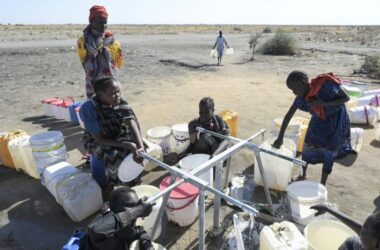
By Lodu William Odiya
The Humanitarian community has called on the South Sudan government and all stakeholders to protect and ensure the safety of civilians including humanitarian workers.
In a statement released yesterday, Anita Kiki Gbeho UN Humanitarian Coordinator for South Sudan called for protection of humanitarian workers.
“On World Humanitarian Day, the humanitarian community calls on the Government, non-state actors and stakeholders to protect and ensure the safety of civilians, including women and children, and humanitarian workers, and to guarantee access to people in need”. Kiki appealed.
She emphasized that since the beginning of the year, there has been 26 causalities, including 15 humanitarian workers and 11 contractors who has been killed or injured, a deeply troubling increase from 15 people the same period last year.
“On World Humanitarian Day, we pay tribute to humanitarian workers in South Sudan and around the world, remember those who have lost their lives in the line of duty, and rally support for people affected by crises,” said Kiki.
World Humanitarian Day is observed every year on August 19. It was established in 2008 to commemorate the 2003 bombing of a Baghdad hotel that killed 22 aid workers.
Humanitarian Coordinator Kiki stated that between January and July 2025, over 200 incidents of direct violence against humanitarians and assets were reported, up from 176 last year.
“Escalating insecurity has forced 56 humanitarian workers to relocate from their operational areas” she said.
She underscored in this country, most humanitarian workers were South Sudanese nationals, serving their own communities with extraordinary courage and commitment.
Today marked the World Humanitarian Day which is also an international day dedicated to recognize humanitarian personnel and those who have died working for humanitarian causes.
“On this day, we honour the commitment of humanitarian workers who, each and every day, reach people in need with life-saving assistance, often under the most challenging and dangerous conditions” Kiki said.
This year’s theme, “Act for Humanity,” carries great significance in South Sudan, where humanitarians continue to deliver amid recurrent floods (1.6 million likely to be affected), growing humanitarian needs (over 70 per cent of the population), increasingly dwindling resources and escalating violence (355,000 displaced since January 2025).
Kiki highlighted that Humanitarian workers continue to stay and deliver, collaborating closely with authorities and communities to reach those in need.
She also added that by June 2025, partners had reached approximately 3.2 million people with life saving assistance, 59 per cent of the 2025 Response Plan target, through all available means, and in hard to-reach, conflict-affected areas.
“Whilst the country needs humanitarian workers more than ever, the humanitarian community faces immense pressures, from a reduction in funding to a surge in attacks on workers, including injuries, kidnappings, and killings,” she added.
The Humanitarian coordinator further urged the international community to remain mobilized in its support to South Sudan and its journey toward peace, recovery, and resilience.
Also on Tuesday, United Nations Secretary-General António Guterres, urged governments around the world to safeguard and support humanitarian workers.
In a video message posted on his X account in honor of World Humanitarian Day, Guterres cautioned of a record-breaking toll in 2024, as at least 383 humanitarians were killed, over half of whom were in Gaza.
He described humanitarian workers as “the last hope for more than 300 million people affected by conflict or disaster.”
UN statistics show that killings of aid workers surged by 31 percent between 2023 and 2024, largely fueled by the ongoing war in Gaza. State actors were found to be the primary perpetrators of these attacks.
“International law is unequivocal: humanitarian personnel must be protected and never targeted. This principle is absolute, it applies to all conflict parties, at all times, everywhere. Yet we continue to witness these red lines being crossed with impunity,” Guterres said.
However, according to the Aid Worker Security Database, the highest number of serious attacks last year occurred in the Palestinian territories (194), followed by Sudan (64), South Sudan (47), Nigeria (31), and the Democratic Republic of Congo (27).
This alarming pattern has continued into 2025. By August, 265 humanitarian workers had already been killed.




